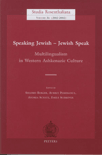
STUDIA ROSENTHALIANA
Scope & Guideline
Illuminating Interdisciplinary Insights on Jewish Culture
Introduction
Aims and Scopes
- Jewish History and Culture:
The journal focuses on the historical narratives of Jewish communities, particularly in Europe and the Americas, examining their cultural practices, social structures, and historical developments. - Interdisciplinary Research:
It employs various methodologies from history, literature, sociology, and cultural studies, facilitating a comprehensive examination of Jewish life and thought. - Critical Engagement with Historical Texts:
STUDIA ROSENTHALIANA engages critically with historical texts, offering analysis and interpretation that illuminate Jewish experiences, particularly during periods of persecution and migration. - Focus on Early Modern Period:
A significant emphasis is placed on the early modern period (1500-1750), exploring its complexities and the implications for contemporary Jewish identity and culture. - Contextual Framework of Jewish Communities:
The journal investigates the interactions between Jewish communities and their non-Jewish surroundings, including colonial contexts and socio-political dynamics.
Trending and Emerging
- Colonial and Postcolonial Jewish Studies:
There is an increasing focus on the experiences of Jewish communities within colonial contexts, examining the complexities of identity and power dynamics in these settings. - Jewish Responses to Modernity:
Emerging discussions center around how Jewish communities navigated the challenges of modernity, including religious reform, social integration, and cultural adaptation. - Gender and Family Dynamics:
Recent articles have begun to explore the role of gender and family within Jewish communities, addressing how these dynamics influenced social structures and cultural practices. - Critical Reexaminations of Historical Figures:
There is a trend toward reevaluating significant historical figures within Jewish history, such as Spinoza, with a focus on their contributions to contemporary Jewish thought and identity. - Intersections of Jewish and Non-Jewish Histories:
The journal increasingly emphasizes the interconnectedness of Jewish histories with broader historical narratives, particularly in relation to European and colonial histories.
Declining or Waning
- Yiddish Culture:
There has been a noticeable decrease in publications specifically focused on Yiddish culture and literature, suggesting a waning interest in this area compared to previous years. - Eastern European Jewish Migration:
Although still relevant, the frequency of articles addressing Eastern European Jewish migration patterns and experiences has diminished, possibly overshadowed by a broader focus on Jewish life in colonial and early modern contexts. - Antisemitism Studies:
Research directly addressing antisemitism, particularly historical perspectives, appears to be less frequent, indicating a potential shift towards more nuanced discussions of Jewish identity rather than a focus on external threats.
Similar Journals
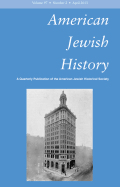
AMERICAN JEWISH HISTORY
Advancing Scholarship on the Jewish American ExperienceAMERICAN JEWISH HISTORY is a premier academic journal published by Johns Hopkins University Press, dedicated to the exploration and analysis of the Jewish experience in the American context. With ISSN 0164-0178 and E-ISSN 1086-3141, this journal serves as a vital resource for scholars and students in the fields of cultural studies, history, and religious studies, as evidenced by its placement in the Q3 quartile across these disciplines in 2023. Reaching a broad audience interested in the historical, social, and cultural dimensions of the American Jewish narrative, the journal has converged in various years, ensuring a robust collection of multidisciplinary research and discussions. Although it operates under a traditional subscription model, the journal remains an essential platform for critical analysis, fostering deeper understanding of Jewish identity and history. With Scopus rankings placing it at the 60th percentile in History and 62nd percentile in Religious Studies, AMERICAN JEWISH HISTORY stands as a respected publication that significantly contributes to the discourse surrounding Jewish history and culture in the United States.
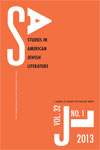
Studies in American Jewish Literature
Illuminating the Intersection of Culture and LiteratureStudies in American Jewish Literature, published by Penn State University Press, is a premier academic journal that delves into the rich tapestry of Jewish literary expression in America. With an ISSN of 0271-9274 and an E-ISSN of 1948-5077, this journal serves a vital role in the fields of Literature and Literary Theory, Cultural Studies, and Anthropology, as evidenced by its placement in the Q1 to Q3 quartiles across various categories in 2023. The journal is a key platform for researchers, professionals, and students interested in exploring the intersection of Jewish identity and American literature, contributing to a deeper understanding of cultural narratives and societal impacts. The publisher's commitment to scholarly excellence ensures that each issue is meticulously curated, showcasing innovative research and critical analysis. While not open access, the journal provides essential insights for anyone engaged in the study of Jewish literature or the broader cultural dynamics at play in American society. Stay informed on contemporary themes and historical contexts that shape literary discourse through this commendable publication.

Judaica Bohemiae
Celebrating the Legacy of Jewish Scholarship in Central EuropeJudaica Bohemiae, published by the Zidovske Muzeum Praze, is a prominent scholarly journal dedicated to the study of Jewish culture, history, and religious practices, with a particular focus on the Czech Republic and Central Europe. Since its relaunch in 2007, the journal has established itself as a valuable resource in the fields of Cultural Studies, History, and Religious Studies, achieving a commendable Q2 ranking across these disciplines in 2023. With its thoughtful compilation of research articles and critical essays, Judaica Bohemiae offers insights into the evolving dynamics of Jewish existence and identity. Although it does not currently operate under an open access model, the journal ensures that its high-quality content remains accessible to researchers, professionals, and students interested in the nuanced intersections of culture and history. By promoting rigorous academic discourse and advancing the understanding of Jewish heritage, Judaica Bohemiae continues to play a crucial role in its field, fostering scholarly connections and illuminating the past for future generations.
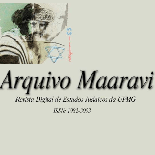
Arquivo Maaravi-Revista Digital de Estudos Judaicos da UFMG
Connecting Scholars in Jewish StudiesArquivo Maaravi-Revista Digital de Estudos Judaicos da UFMG is a distinguished open-access journal dedicated to the field of Jewish Studies, published by the Universidade Federal de Minas Gerais (UFMG). With an ISSN of 1982-3053, the journal has been serving the academic community since 2007, facilitating the dissemination of research and scholarship in Jewish cultural, historical, and religious studies. Situated in the vibrant academic landscape of Brazil, the journal aims to foster dialogue among researchers, professionals, and students, providing a platform for innovative and critical perspectives. Although the H-Index and specific Scopus ranks are not available, the journal's commitment to academic rigor and open access ensures that its content reaches a broad audience, empowering researchers and enriching the field of Jewish studies worldwide. The journal is based at FAC Ciências Econômicas, Av. Antonio Carlos, 6627, Belo Horizonte MG 31270-901, Brazil, making it an integral part of the UFMG's academic ecosystem.

JEWISH SOCIAL STUDIES
Illuminating the past, present, and future of Jewish social thought.Jewish Social Studies is a prominent peer-reviewed journal published by Indiana University Press, dedicated to advancing the field of Jewish scholarship through interdisciplinary exploration and critical inquiry. With an ISSN of 0021-6704 and an E-ISSN of 1527-2028, this journal has become a vital resource for researchers and scholars, achieving Q2 rankings in both History and Religious Studies, as well as strong standings in Anthropology and Cultural Studies. The journal bridges the gaps between diverse academic disciplines, focusing on the multifaceted dimensions of Jewish life, culture, and history, making it essential reading for anyone engaged in the study of Judaism. Although it does not currently offer Open Access options, the journal promotes a wealth of rigorous research, critical perspectives, and in-depth analyses that contribute significantly to the understanding of Jewish Studies from 1975 to the present day, with ongoing issues scheduled until 2024. With an established audience of scholars, professionals, and students, Jewish Social Studies remains a leading platform for intellectual discourse and scholarly exchange in the humanities.
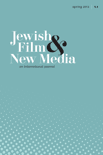
Jewish Film & New Media-An International Journal
Fostering Dialogue on Jewish Representation in the Digital AgeJewish Film & New Media: An International Journal, published by Wayne State University Press, serves as a crucial platform for scholars and practitioners within the realms of Film Studies, Jewish Studies, and Media Studies. Since its inception, the journal has explored the intersection between Jewish culture and cinematic representation while also addressing contemporary media narratives. With an ISSN of 2169-0324 and E-ISSN 2169-0332, it is indexed in major databases, showcasing solid rankings in various disciplines, including a commendable Q2 rank in Visual Arts and Performing Arts. Despite its current Q4 categorizations in Anthropology and Communication, the journal is noted for its engaging contributions that sow rich discussions about Jewish identity, filmic expression, and media representation. Researchers and students alike benefit from the journal’s wealth of interdisciplinary scholarship, which spans converged years from 2013 to 2017 and 2019 to 2022, ensuring a robust timeline of critical inquiry. As an essential resource for understanding the nuances of Jewish film and new media, this journal occupies a unique niche, inviting contributions that push the boundaries of current academic dialogue.

Jewish Studies Quarterly
Exploring Jewish Identities Across Time and SpaceJewish Studies Quarterly, published by MOHR SIEBECK, is a leading academic journal dedicated to advancing scholarship in the field of Jewish studies. With its ISSN 0944-5706 and E-ISSN 1868-6788, this journal provides a platform for rigorous research that explores various dimensions of Jewish history, culture, religious practices, and contemporary issues. Although it does not currently offer open access options, it remains an essential resource for researchers, professionals, and students seeking insightful analysis and academic discourse. The journal is widely recognized for its commitment to excellence and contribution to understanding Jewish identities within global contexts. Located in Tübingen, Germany, Jewish Studies Quarterly is integral to the dialogue and scholarship surrounding Jewish thought and heritage, making it a vital reference point in the academic community.
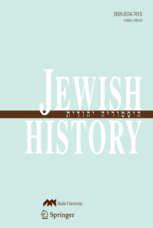
Jewish History
Charting the Course of Jewish Heritage and CultureJewish History is a significant academic journal published by Springer, focusing on the multifaceted historical narratives of Jewish communities worldwide. With roots tracing back to 1986, this esteemed journal offers an intellectual platform where researchers and scholars can engage critically with the vast and rich tapestry of Jewish heritage, culture, and experiences. Although it operates under a traditional subscription model, the journal has gained a notable standing in recent years, achieving a Q4 ranking in Cultural Studies and a Q3 ranking in History for 2023, reflecting its robust scholarly contributions. The journal is indexed in Scopus, with a rank of #808 in Arts and Humanities History and #754 in Social Sciences Cultural Studies, placing it within the competitive landscape of academic publishing. Its commitment to advancing the field of Jewish studies makes it an essential resource for researchers, professionals, and students alike, who seek to deepen their understanding of Jewish history from historical, cultural, and social perspectives.
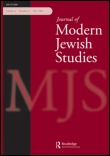
Journal of Modern Jewish Studies
Fostering Insights into Modern Jewish Life and TraditionsThe Journal of Modern Jewish Studies, published by Routledge Journals, Taylor & Francis Ltd, serves as a premier platform for scholarly discourse in the realm of Jewish studies, particularly addressing the contemporary intersections of culture, history, and political science. Established in 2002, this journal has become increasingly vital, as demonstrated by its categorization in the Q3 and Q4 quartiles across various fields, including Cultural Studies and History, showcasing its pivotal role within the academic community. Despite not being an open-access journal, it continues to maintain a robust ranking, being placed in the 74th percentile for History and 62nd percentile for Cultural Studies in the Scopus Ranks. This illustrates the journal's commitment to high-quality research and its significant contribution to understanding the complexities of modern Jewish life and traditions. Based in the United Kingdom, the journal's outreach and content are designed to engage researchers, professionals, and students who are passionate about exploring the diverse facets of Jewish identity and its implications in contemporary society.

Nordisk Judaistik-Scandinavian Jewish Studies
Illuminating the Rich Tapestry of Scandinavian Jewish StudiesNordisk Judaistik-Scandinavian Jewish Studies is a distinguished academic journal dedicated to the exploration of Jewish culture, history, and religious practices in the Scandinavian context. Published by the DONNER INSTITUTE FOR RESEARCH ON RELIGIOUS AND CULTURAL HISTORY in Finland, this journal has been an open access platform since 2016, allowing easy dissemination of knowledge and fostering scholarly communication among researchers, educators, and students. With a variety of subjects encompassing Anthropology, Cultural Studies, History, and Religious Studies, the journal has achieved commendable recognition, with its latest rankings placing it in Q2 in several categories according to the 2023 Scopus rankings. The journal's significant contribution to the field is evident through its impact, evidenced by its strategic position within its respective quartiles. By bridging interdisciplinary methodologies and Jewish studies within a Scandinavian framework, Nordisk Judaistik serves as an essential resource for those engaged in the complexities and nuances of Jewish heritage and identity in the region.